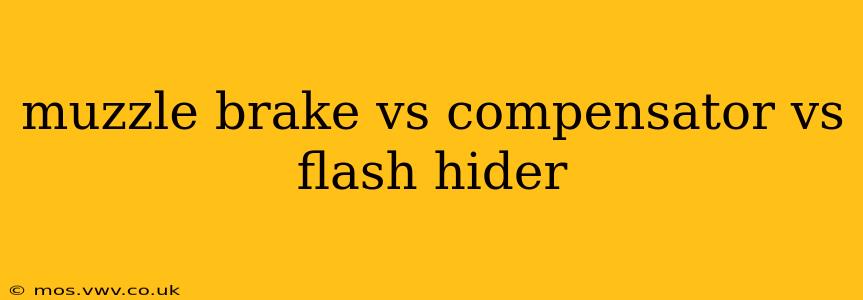Muzzle Brake vs. Compensator vs. Flash Hider: A Deep Dive into Firearm Muzzle Devices
Choosing the right muzzle device for your firearm can significantly impact its performance and handling. While they might look similar at first glance, muzzle brakes, compensators, and flash hiders each serve distinct purposes. This comprehensive guide will break down the differences, helping you make an informed decision based on your specific needs.
What is a Muzzle Device?
Before diving into the specifics, let's define what a muzzle device is. It's any attachment fitted to the end of a firearm's barrel, designed to modify the gases escaping the muzzle. This modification affects various aspects of shooting, from recoil reduction to flash suppression.
Muzzle Brake: Conquer Recoil
A muzzle brake is primarily designed to reduce felt recoil. It achieves this by venting propellant gases laterally (to the sides) or upwards, creating a counter-force that pushes against the recoil impulse. This results in a much smoother shooting experience, particularly beneficial for high-caliber rifles or those with significant recoil. The downside is increased muzzle blast and potential for hearing damage for shooters nearby.
Advantages of a Muzzle Brake:
- Significant recoil reduction: Makes rapid follow-up shots easier.
- Improved accuracy: Reduced recoil leads to better control and target acquisition.
Disadvantages of a Muzzle Brake:
- Increased muzzle blast and noise: Can be uncomfortable and potentially harmful to those nearby.
- Potential for lateral force: Can affect neighboring shooters on a firing line.
Compensator: Control Muzzle Rise
A compensator focuses on mitigating muzzle rise. While some recoil reduction is a common side effect, the primary goal is to control the upward force of the escaping gases. Compensators typically vent gases upwards, counteracting the rotational forces that cause the barrel to jump upward after firing. This improves accuracy and allows for faster target reacquisition.
Advantages of a Compensator:
- Reduced muzzle rise: Maintains sight alignment more effectively.
- Improved accuracy and follow-up shot speed: Faster target reacquisition.
- Often less noisy than a muzzle brake: Reduces some blast, though not as much as a flash hider.
Disadvantages of a Compensator:
- May not significantly reduce recoil: Its primary focus is on muzzle rise, not recoil mitigation.
- Can still produce some muzzle blast: While less than a muzzle brake, it's still present.
Flash Hider: Minimize Flash Signature
A flash hider is designed to reduce the muzzle flash visible when firing a weapon. This is achieved by manipulating the escaping gases, diverting them away from the shooter's line of sight. This improves tactical stealth, especially in low-light conditions, by minimizing the shooter's visible signature. While flash hiders can offer some recoil reduction or muzzle rise control as a secondary benefit, it's not their primary function.
Advantages of a Flash Hider:
- Reduced muzzle flash: Improves tactical concealment, especially at night.
- Often quieter than a muzzle brake: Reduces some blast, contributing to quieter operation.
Disadvantages of a Flash Hider:
- Minimal recoil or muzzle rise reduction: The primary benefit is flash suppression.
- Can sometimes slightly increase muzzle blast: Depending on design.
Which Muzzle Device is Right for You?
The best muzzle device depends entirely on your priorities and the type of shooting you engage in.
- Competitive shooters: Often prioritize compensators for improved target reacquisition speed.
- Long-range shooters: May prefer muzzle brakes for significant recoil reduction, enabling precise shots at longer distances.
- Tactical or military applications: Often utilize flash hiders for concealment and operational stealth.
- Hunters: Might choose a muzzle brake for recoil mitigation or a flash hider to reduce the chance of startling game.
Ultimately, understanding the nuances of each muzzle device allows you to make an informed choice that best suits your specific needs and shooting style. Consider your priorities and the trade-offs involved before making a decision. Proper installation is crucial for optimal performance and safety. Consult a qualified gunsmith if you're unsure about the installation process.
Frequently Asked Questions (Based on Google's "People Also Ask")
While specific questions varied across searches, the following address common queries related to muzzle devices:
H2: Are muzzle brakes legal?
The legality of muzzle brakes varies by jurisdiction. Some states or regions have restrictions on certain types of muzzle devices, especially those considered excessively loud or destructive. It's crucial to check your local and state laws before purchasing and using any muzzle device.
H2: Can you put a compensator on any gun?
No. You can only install a muzzle device on a firearm designed to accommodate it. Thread pitch and overall dimensions need to match precisely. Improper installation can damage the firearm and is extremely dangerous. Consult your firearm's manual or a qualified gunsmith to ensure compatibility.
H2: Do muzzle brakes damage your barrel?
Improperly installed muzzle brakes can damage the barrel. High-quality muzzle devices, properly installed and maintained, shouldn't damage your barrel. However, constant exposure to high pressures and gases can accelerate wear over time.
H2: Which is better: a brake or a compensator?
The "better" choice depends on your priorities. A muzzle brake prioritizes recoil reduction, while a compensator focuses on reducing muzzle rise. Consider your shooting style and what aspect of firearm performance is most important to you.
H2: How much do muzzle brakes reduce recoil?
The recoil reduction offered by a muzzle brake varies depending on the design, caliber of the firearm, and ammunition used. Some brakes offer substantial recoil reduction, while others provide more modest improvements.
This guide provides a comprehensive understanding of the differences between muzzle brakes, compensators, and flash hiders. Remember always to prioritize safety and legality when choosing and using firearm accessories.
